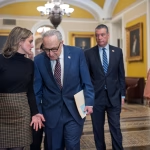Angela Rayner’s political future hangs in the balance after she admitted underpaying £40,000 in stamp duty on her £800,000 Hove flat—a scandal that cuts to the heart of her credibility as both Deputy Prime Minister and Housing Secretary.
Angela Rayner, the Deputy Prime Minister and Housing Secretary, is facing her most serious political crisis yet after revelations that she underpaid stamp duty on the purchase of her £800,000 flat in Hove. The controversy has sparked fierce debate over whether she acted in good faith or knowingly benefitted from a tax saving.
According to a detailed report by BBC News, the Labour frontbencher initially consulted three individuals before the purchase—one with conveyancing expertise and two with knowledge of trusts—but it remains unclear if any were experts in the complexities of tax law.

Angela Rayner celebrates with Sir Keir Starmer after Labour’s election win, a moment of unity now tested by her stamp duty row.
A Dispute Over Advice and Accountability
Rayner has firmly denied deliberately trying to dodge the higher stamp duty rate applied to additional property purchases. The Times reports that she has instead blamed what she calls a “mistake” on incomplete legal advice that “failed to properly take account” of her family’s trust arrangements. The trust, originally set up following her divorce, was designed to secure housing for her son, who has lifelong disabilities.
Fresh legal advice has since concluded that the arrangement triggered what lawyers call “complex deeming provisions,” meaning Rayner should have paid the higher rate of stamp duty on the Hove flat. As the Financial Times notes, this meant she underpaid by around £40,000.
Mounting Political Pressure
The revelations have left Rayner under intense scrutiny. Technology Secretary Peter Kyle has stressed that Labour leader Sir Keir Starmer continues to back his deputy, but he acknowledged it will ultimately fall to Sir Laurie Magnus, the independent adviser on ministers’ interests, to decide if Rayner took reasonable steps when seeking advice. If precedent is any guide, that investigation could conclude in a matter of days.
Education Secretary Bridget Phillipson told BBC Breakfast that Rayner received updated legal advice as late as Wednesday, which confirmed her liability for additional stamp duty. Phillipson insisted Rayner had acted in good faith, only constrained from speaking publicly sooner due to a court order linked to her family’s arrangements.
The Conservatives, however, have not relented. Party chairman Kevin Hollinrake argued on BBC Breakfast that HMRC’s rules on trusts and stamp duty are “clear” and accused Rayner of hypocrisy given her previous criticism of others over tax avoidance. Nigel Farage, leader of Reform UK, has gone further, demanding her immediate resignation.

Angela Rayner’s Hove flat, purchased in 2025, where she recently admitted underpaying £40,000 in stamp duty.
Potential Financial Penalties
The financial consequences could be significant. Rayner has already contacted HMRC to settle the underpaid tax, but whether she faces additional penalties depends on how her conduct is assessed. If her actions are deemed careless, she could be fined around £12,000 on top of the £40,000 shortfall. If HMRC rules she acted deliberately, the fine could double the amount owed.
Sean Randall, a leading independent stamp duty specialist, told the BBC that the key issue will be whether Rayner had a “reasonable excuse” for her error. He emphasised that simply claiming reliance on advice is not enough: she must also show what information she provided and what guidance she received in return.
The Trust at the Heart of the Dispute
The controversy is rooted in the trust arrangement involving Rayner’s family home in Ashton-under-Lyne, Greater Manchester. After her divorce, some of her stake in the property was sold into a court-instructed trust to provide security for her son. In a statement, Rayner explained that this allowed him to continue living in a home where he felt safe, describing it as “a standard practice in circumstances like ours.”
However, while the arrangement was designed to protect her son, legal experts now believe it triggered provisions that made her liable for higher-rate stamp duty on the Hove flat purchase in May. Rayner acknowledged her reliance on lawyers who had not considered the full implications. “I deeply regret the error that has been made,” she said, pledging full transparency and cooperation.

Angela Rayner shares a lighthearted moment with Labour leader Sir Keir Starmer, showing solidarity despite ongoing political scrutiny.
Wider Implications for Labour
This case has broader political implications. As Housing Secretary, Rayner has been vocal about tackling unfairness in the housing market, making her own tax controversy especially damaging. Critics argue her position is untenable, while Labour supporters stress her openness in admitting the error and seeking resolution.
Sir Keir Starmer defended her during Prime Minister’s Questions, saying he was “very proud to sit alongside her.” Yet the outcome of Sir Laurie Magnus’s investigation could decide whether Rayner retains her ministerial posts or is forced to resign.
People Also Ask (FAQs)
Did Angela Rayner deliberately avoid paying stamp duty?
Rayner insists she did not deliberately avoid the higher tax rate. She says she acted on professional advice at the time, only later discovering that her trust arrangement triggered additional liabilities.
How does stamp duty work when trusts are involved?
Stamp duty becomes more complex when trusts or shared property ownership are involved. Certain trust arrangements can be “deemed” to count as an additional property interest, triggering higher rates of tax.
What is the role of the independent adviser on ministers’ interests?
Sir Laurie Magnus, who currently holds this position, investigates whether ministers have followed the Ministerial Code. His findings can determine whether political leaders take disciplinary action.
What happens if HMRC rules Rayner acted deliberately?
If HMRC finds her actions deliberate, she could face a fine equal to 100% of the tax underpaid—meaning her total liability could rise above £80,000.

Angela Rayner arrives at 10 Downing Street with a confident smile amid the ongoing stamp duty controversy.
Conclusion
Angela Rayner’s stamp duty controversy is as much about perception as legality. Whether this was an innocent mistake or a lapse in judgment, the case highlights the complexity of property taxation and the scrutiny faced by senior politicians. With both HMRC and Sir Laurie Magnus now examining the details, the outcome could decide not only her financial liability but also her future in frontline politics.
Rayner has pledged transparency, but in the high-stakes world of Westminster, even an honest mistake can carry a heavy political price.














